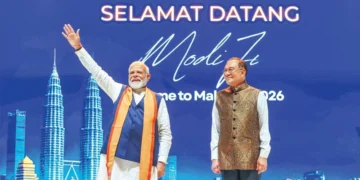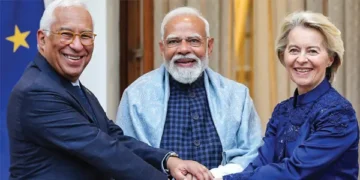 AS the world wages a war against terrorism and organised crime nexus, security experts in India feel ‘One Nation, One Police’ is an idea whose time has come.
AS the world wages a war against terrorism and organised crime nexus, security experts in India feel ‘One Nation, One Police’ is an idea whose time has come.
A Niti Aayog paper has made a strong pitch for shifting police and public order from the State List in the Seventh Schedule of the Indian Constitution to the Concurrent List.
This will pave the way for a single police Act for the entire country and a pan-India law to tackle organised crime and terrorism under a unified framework.
The proposal has received unequivocal support from eminent leaders of the legal and law enforcement fraternity, including Indian Police Foundation Chairman Prakash Singh and top constitutional expert Fali Nariman, just to name the two.
The Seventh Schedule, which enumerates subjects for legislation in three lists (Central, State and Concurrent) is a relic of the colonial past, inherited from the Government of India Act, 1935.
However, these lists do not reflect the complex realities of India in its 75th year of the country’s Independence. While law and order figures in the State list, states often seek the help of Central forces in times of crisis.
The Supreme Court and various High Courts have entrusted the CBI and other Central agencies to intervene when they find the state police either incapable, or unwilling to do the job.

The need for inclusion of public order in the Concurrent List originates from significance of public order for national security; economic development; inter-state crime and the legitimacy of the state. Prima facie, it is a Herculean task to tackle the same in an era which is swayed and dominated by internet, encrypted end-to-end communication and mobile technologies.
This requires integrated legal, administrative and operational framework for the police force across the nation as one entity. And it can be achieved only by empowering the Union Government to have primacy over the Police and Public Order under its wings in the same manner as it happens in context of other subjects in the Concurrent List as prescribed in Article 254 of the Constitution.
“All state governments depend on the Centre to maintain law and order. An amendment to the Constitution would give de jure status to what is already de facto on the ground,” argues Prakash Singh, former chief of the BSF and the UP Police.
The Centre is responsible to meet external threat. Therefore, it should be empowered to counter internal crimes with inter-state ramifications, more so as the internal and external threat may be entwined and launched by anti-nationals targeting India.
According to Fali Nariman, such an amendment would be in keeping with the recommendation of the Second Administrative Reforms Commission. “Till this is done, the least the Government should do is declare certain crimes as ‘federal’ and entrust their investigation to a Central agency,” he suggests.


























